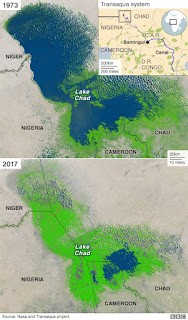Colorado River and Lake Chad: two sides of the same coin
Our water bodies are shrinking and this is having a downturn on agricultural activities and their users. As our natural resources shrink it will lead to resource control within and between users which is the state where both Lake Chad and Colorado River are currently and invariable conflict becomes inevitable in the bid to protect boundaries against resource scarcity. Both the Colorado River and Lake Chad have more than 30 million people that depend on them for survival and the water body stretches across different countries and communities. A decrease in the flow of the river could mean eroding away livelihoods, it could also mean conflict. Agriculture is now a very sensitive sector to the changing climate. If we don’t act now it will lead to hunger and poverty enough for the smallest population.
Lake Chad was once a mega Chad Lake but now it is a shadow of itself. From 25,000km square to 1,500km square thus it has not had a stable Lake since the 1960s. Likewise, Lake Chad borders Nigeria, Chad, Cameroon, and Niger. Same as Colorado, which tens of millions of people rely on it across seven western states, 30 Native American tribes, and Mexico. According to a report, the flow of the Colorado River has dropped 20 percent since the 1900s; of which the decline is attributed to over 20 years of climate change-induced “mega-drought” in Colorado and the West.
As both water bodies’ recedes it is leading to the outbreak of conflict between users and countries, especially those that are downstream will feel the greatest impacts. It was noted that 100 years ago, seven states signed the Colorado River compact, which lays out how much River water each state gets but such an agreement could get distorted if the river keeps drying up and therefore needs a quick and rapid response to avert crisis; cutting off some water users is not a feasible solution because water is life and water is right. At the same time, as the size of Lake Chad depends on Logone and Chari River, so does the Colorado River depend on Lake Mead which has been less than 40% full since 2015, and Lake Powell which has been below 50% capacity since 2013. These are all indicators of the impacts of climate change on our human rights.
If there are no policies and actions now, once these water bodies dry up, it will become a total disaster that will not be limited to the countries it borders but also it will affect all other countries since we all depend on each other for resources. We need a water treaty for regions like Lake Chad including the Colorado River to fit into the current reality in a bid to act on the crisis.
By Oladosu Adenike (oladosuadenike32@gmail.com), an eco-reporter, climate justice activist, and ecofeminist.





.jpeg)

0 Comments
We are open to listening to your comment.